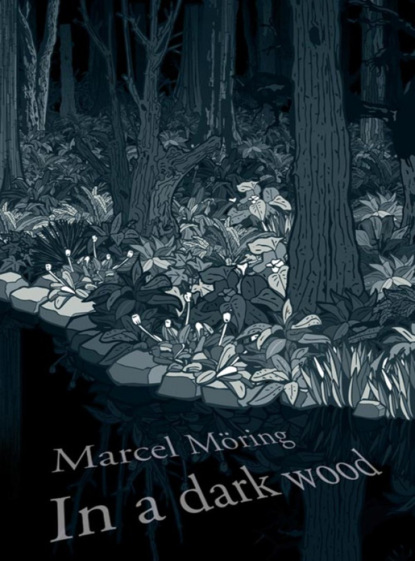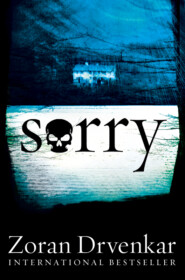По всем вопросам обращайтесь на: info@litportal.ru
(©) 2003-2024.
✖
In A Dark Wood
Автор
Год написания книги
2018
Настройки чтения
Размер шрифта
Высота строк
Поля
Hilbrandts Aryan Bookshop
He stands over the crossbar of his bicycle, which isn’t his bicycle, and looks at the red board with the black letters. Mouth open.
Aryanbloodybookshop?
On the brown velvet of the window display no Russian leather boots, gleaming Oxfords, stout brogues or slender court shoes, but a magazine called The Hearth, a sheet of paper with curling edges and an envelope on which in stark black and white the firm jaws of a Teutonic model worker gleam. Next to it a book bearing the unreal title Mother, Tell Us about Adolf Hitler! and a few dead flies lying against the glass.
His father’s shop, started by his grandfather, half of the premises back then, a pitiful business where poor people had their poor shoes made by a poor shoemaker, a dark workshop where all the walls were covered with shelves packed with shoes and boots, here and there even a clog that needed a strap put round it. Behind the light-brown counter his grandfather, sitting on the three-legged stool, had knocked, hammered, cut, sewn and scoured. There was a sewing machine powered by a foot pedal, a device bought sometime around 1915 or ’16, such a major acquisition that the machine had to be polished each evening till the brass gleamed and the black-painted cast iron shone like a new stove. Oh, if he shut his eyes now, he could hear the machine’s heavy flywheel hum, the sticky smell of the glue pot on the stove would come to life in the back of his head. Knives crooked and straight, pitched thread hanging over a stick, lasts, punch awls and sewing awls, oxhide for making soles, calf, horse and goat for the uppers in reeking stacks, bent needles, straight needles, round, triangular, thick, thin, short and long, aniline and beeswax, grease and cream, oily sheep’s wool, flannel rags, horsehair brushes, iron scrapers.
And the voice of his grandfather softly, along the thread between his teeth, singing a little song …
When Rabbi Elimelech went on his way …
A goddamned Aryan …
He stands in the unimaginable silence of the gloomy bookshop, where amidst the smell of paper and linen a vague olfactory memory of shoes is barely discernible and the ringing of the shop bell still echoes, and sees what looks like a trick of the light, but is actually a bookshop. Footsteps sound in the dark corridor between the house and the shop and out of the shadows steps a surly-looking man in waistcoat and shirtsleeves.
‘We’re closed.’
Jacob Noah stares the man in the face with an expression that could only be called blank: no trace of a reaction, no emotion, no expression, eyes as empty as creation before the Supreme Being rolled up his sleeves and made something of it.
Silence hangs between them, a gauzy silence that makes the space dense and diffuse and reminds him of something he doesn’t know. His thoughts travel through the landscape of his past.
How sharp it all is … the light that falls through the dusty windows, brushes across the counter and lays a silk-soft gleam on the wood, worn smooth by all that use and time … how sharply drawn the pigeonholes in the boxes along the walls, where shoe-boxes used to be stacked, floor to ceiling, wall to wall, a mosaic of white, pink, black, green, red, brown, blue, mauve and grey rectangles.
‘We’re …’
‘Out. Of. My. Shop.’
The man screws up his eyes and looks at him as if he has been addressed in a language that bears no relation to any language he has ever encountered before.
‘OUT.’
He speaks, as far as he can tell, loudly, but what emerges from his throat is a strangled and barely comprehensible croak.
‘I don’t know who you are, but this is my shop and …’
Jacob Noah, in the bloom of his life, small admittedly and after those years in his hole in the bog unmistakeably pale and thin, thin as he will make a point of not being for the rest of his life, lifts himself up like a bear disturbed while eating. His chest swells like a bellows, and although it is doubtless not really the case his hair seems to stand on end. His shoulders rise, his small, almost feminine hands unfold into enormous coal shovels and his feet suddenly feel so strongly rooted to the earth that it’s unlikely that even a tornado could shift him from the spot.
‘Jacob Noah!’ he roars. ‘Son of Abraham Noah! Son of Rosa Deutscher! Brother of Heijman Noah! This shop is my father’s shop! OUT!’
The man looks at him through narrowed eyes and takes a barely perceptible step back.
They stand facing one another, attracted by their mutual dislike, repelled by a curiosity that fills them both with nausea. Tiny muscular spasms ripple over their faces and through their bodies. Jacob Noah’s jaw tenses and AryanBookshopHilbrandts’ throat muscles ripple, Jacob Noah’s midriff hardens and AryanBookshopHilbrandts’ thighs twitch, Jacob Noah’s stomach shrinks and Aryan Bookshop Hilbrandts’ shoulders bend.
‘It’s my shop,’ the other man says. ‘I know nothing of any previous tenants. I’ve always paid on time.’
Jacob Noah feels the blood thump in his neck. Then he turns round with a jerk and grabs for the door handle.
In the full light of the midday sun he blinks against the brightness of the world. Two women walk past and don’t recognise him.
Aryanbloodybookshop.
He cycles
and he cycles
and he cycles
and he cycles.
He cycles
along the Gedempte Singel, right down Brinkstraat, left up the Brink, where he throws the bike against the wall of the town hall and storms in.
‘Who’re you?’ says the official whom he gets, after five other imperturbable officials, to speak to.
He says his name. He says his father’s name. He would, if it was still in his possession, show his identity card.
The official rises to his feet, walks to the row of filing cabinets behind him, opens a drawer, runs his fingers over the files and, interrupting himself with barely audible remarks (‘No, not that one. Mi, Mij, Mo, Mu. There it is’), he hums a cheerful little tune. He pokes his nose into a folder (‘Yesyesyes. Humhum’) and walks with the file to another row of cabinets, where the same business starts all over again (‘marketmarketmarket, no, there it is’) and at last a fat bundle of cards, architectural drawings and loose papers is revealed.
‘Here it is. No, that property is let to G. Hilbrandts from 13 November 1942. Vacant premises, I see. So.’
‘It’s my property.’
‘Ah, no, I don’t think so. A certain D. Noah, I see here, and you were J. Noah, I seem to remember. So we need Mr D. Noah.’
For a moment the wooden floor of the department of buildings and dwellings gleams smooth and brown as the counter in the shop. Behind the windows lies the sunlit town, where people are walking in the street and hanging pennants from their houses. The greenery, thick and heavy on the trees, promises a lovely summer.
‘There was a war.’
‘Yes,’ says the official, in a tone which suggests that he came across this fact in one of his files a long time ago: World War II, 10 May 1940–5 May 1945.
‘I don’t know where my father is. I don’t know where my parents are. We were in hiding. Taken away.’
The official looks at him confidently.
‘Then it’s a matter of waiting until the affair is administratively clarified, but I can assure you that everything will sort itself out.’
‘There’s a bloody Nazi in that property! My father’s shop … I live there. We … Our life. Our things.’
He has trouble getting the words out and that annoys him.
‘None of that falls within my area of competence. The premises were let by the then government to …’ He glances at the file. ‘G. Hilbrandts.’
‘By whom?’
‘What do you …’
Другие электронные книги автора Shaun Whiteside
Sorry




 0
0






